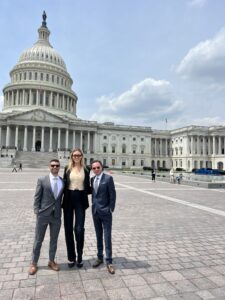A Year of Progress
2023 has been a year of progress for the “All Copays Count” movement. To date, 19 states and Puerto Rico have passed legislation protecting patients from copay accumulator programs. And on September 29, the U.S. District Court for the District of Columbia ruled in favor of patients, vacating the 2021 U.S. Department of Health and Human Services Notice of Benefit and Payment Parameters (NBPP). The court struck down a federal rule that allowed insurers to implement copay accumulator programs.
Copay Accumulator Programs
As a reminder, copay accumulator programs allow insurers to collect copay assistance, typically in the form of a copay card or a copay assistance program from a drug manufacturer, without counting it toward a patient’s deductible or out-of-pocket maximum. The Infusion Access Foundation has heard from patients who have been unaware of these programs, until it’s too late. A patient will receive their infusion like normal, use a copay card or have their copay reduced by a manufacturer assistance program, only to receive a bill from their insurance company for their full deductible weeks later.
New Ruling
Nineteen state legislatures and Puerto Rico have been successful in pushing back on these programs by requiring insurers to count any payment made by or on behalf of a patient (with some states only requiring this for drugs without a generic equivalent). And now with Judge John. D. Bates’s decision, insurers must abide by the 2020 federal rule that stated copay accumulator programs are only permissible for branded drugs for which there is a generic equivalent, and if allowed by state law.
With this ruling, insurers in the Affordable Care Act (ACA) exchanges must accept copay assistance for drugs that lack generic equivalents. The agency could reissue regulations on this topic in the future, and U.S. Department of Health and Human Services (HHS) has stated that it intends to issue guidance in reference to the court’s decision, but for now patients who purchased their insurance on the Health Insurance Marketplace are able to use copay assistance on drugs without a generic equivalent as the ruling goes into effect immediately.
Advocacy in Action
The Infusion Access Foundation joined 29 patient, provider, and consumer organizations in filing an amicus brief in support of the plaintiffs in the case brought against HHS: the HIV+Hepatitis Policy Institute, the Diabetes Leadership Council, the Diabetes Patient Advocacy Coalition, and three individual patients who suffered harm when their insurers implemented accumulator programs. This is a huge win for patients. The next step is to keep the pressure on federal lawmakers to enact the HELP Copays Act, which would codify into federal law the prohibition on accumulators in the exchanges, thereby closing off the opportunity for this or a future Administration to revisit the issue via regulation.









